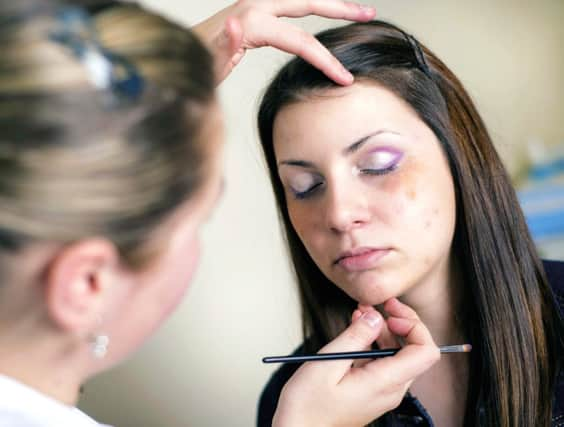Training for salon staff to spot domestic abuse


The workshops, which will be piloted at Ayrshire College in the new year, are the brainchild of the organisation Medics Against Violence (MAV) and aim to capitalise on the intimate relationships people who work in salons forge with their customers.
It is hoped the scheme, which has been unveiled during Women’s Aid’s 16 Days of Action, will help salon workers spot injuries that might go unnoticed by other people and give them the confidence to reach out to women affected by domestic abuse.
Advertisement
Hide AdAdvertisement
Hide Ad“When a woman visits her hairdresser or beautician she’s in quite a protected setting and her partner is unlikely to be present,” said Dr Christine Goodall, one of the founders of MAV and an oral surgeon who has treated victims of violence.
For some with controlling partners, a salon may be the only place they are allowed to go on their own. Hairdressers come into close contact with clients’ heads, seeing their scalp while washing and the back and front of their necks while cutting. Beauticians, meanwhile, are likely to see other parts of the body which are usually covered up.
Studies have shown facial bruises on a woman are 32 times more likely to be caused by domestic abuse than anything else. “Women tend to go to the same hairdresser or beauty therapist time after time, they know them and will chat to them,” said Goodall.
CONNECT WITH THE SCOTSMAN
• Subscribe to our daily newsletter (requires registration) and get the latest news, sport and business headlines delivered to your inbox every morning
“Hairdressers and beauticians tend to be good communicators, so they really are in a an ideal position to see the signs and offer support.
The MAV programme is adapted from an American initiative called Cut It Out. In January, two classes of around 20 students – one beauticians, one hairdressers – will learn to deal with suspected abuse through a process known as AVDR (Ask, Validate, Document, Refer).
“The most important thing if you see someone you suspect is a victim of domestic abuse is to ask them about it,” Goodall said. “A lot of the time, and this has certainly happened to me, you will sit with someone who you think has been a victim, they know they’re a victim, but you dance round the issue and nobody asks anybody anything. The clinicians don’t have the skills and confidence to ask and they worry about offending people, but the patients don’t want to have to bring it up, they want to be asked.”
Next, the hairdressers and beauticians will be encouraged to tell the woman that what is happening to her is wrong and not her fault, to document their concerns and to give her the information to get help. They will be warned not to get more deeply involved, however, as, if a woman intends to leave her partner and/or report abuse, she may be in danger and is better off with specialist organisations.
Advertisement
Hide AdAdvertisement
Hide AdMAV was set up in 2008 after Goodall worked on a research project on alcohol with Karyn McCluskey, now director of the Violence Reduction Unit. Goodall knew 80 per cent of the injuries she was treating were sustained through violence and wanted to try to prevent it.
In 2010, the group started working with dentists and then vets to encourage them to recognise and tackle domestic abuse. So far they have trained around 600 dentists and 60 vets (abuse against animals is often used as a means of controlling a partner). They also started training fire officers.
“When we do these workshops, we find around 15 out of 20 people will say they have been in a situation where they have suspected domestic abuse but been unsure what to do about it,” Goodall said.
The workshops have given them more confidence. The day after attending, one vet phoned MAV to say a pregnant woman had come in with a small dog with a suspicious injury – three fractures in its leg. “After speaking to us, the vet referred the case to the SSPCA and gave her advice and some leaflets on domestic violence to take away,” Goodall said.
The initiative will be piloted on Ayrshire College’s Kilmarnock campus, though it is hoped it will be extended to its Ayr and Kilwinning campuses.
SCOTSMAN TABLET AND IPHONE APPS